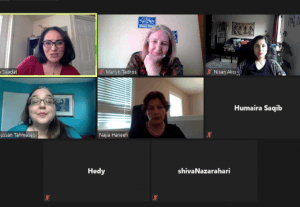The panel on Advocacy for Women’s Rights Peace and Security in MENA: Challenges of Shrinking Civic Space was organized by FEMENA on March 23rd, 2021. Human rights defenders from Afghanistan, Egypt, Turkey, and Iran:
Sussan Tahmasebi – FEMENA – Director
Aida Saadat – FEMENA Program Manager
Nisan Alıcı – Demos Research Association – Board member & Researcher
Najia Haneefi – Women Living Under Muslim Laws – Board Member
Humira Saqeb – women network in urban governance – co-founder
and Marlyn Tadros – Virtual Activism
Panelists responded to the following questions:
Q1) How do women in your country view the issue of security, beyond the narrow definitions of State security? What are their main security concerns.
Q2) What is the women’s movement in your country doing to address these concerns and how has the shrinking space for civil society impacted their ability to advocate for these issues?
Q3) Many women and activists facing pressures and threats have moved to online spaces to express themselves and/or to promote women’s rights and peace. Explain what that looks like in your country. Are they facing backlash in the virtual world as well?
Highlights from @FEMENANET tweets
- While WHRDs in Egypt are persecuted for their advocacy to ensure women’s rights, and NGOs are being shut down and their work limited in Egypt, laws are being proposed to push back women’s legal gains including in marriage. @virtualactivism
- Women human rights defenders & ordinary women are being persecuted in Egypt, according to Marlyn Tadros Director of @virtualactivism WHRDs face terrorism charges for advocacy work for women’s rights. Ordinary women face morality charges for expressing self online.
- Turkey has pulled out of the Istanbul Convention at a time when femicide is at an all time high. There was anti LGBTI discourse used by the State to justify withdrawal from the Convention. @NisanAlici
- Afghan women are on the verge of losing everything they have worked so hard to establish, because of this imposed #AfghanPeaceProcess Naja Haneefi.
- Egypt gov is preventing civil society activism, but women have started organize online. The Egyptian #MeToo movement is one example. Marlyn Tadros
- Online spaces are great for women in MENA trying to organize in repressive contexts and when civic space is shrinking. But WHRDs can face pressures and harassment online as well, says Marlyn Tadros
- Iranian women’s movement has been isolated for 40 years, but Iranian WHRDs are eager for regional & international connections, says @sussantweets. The international women’s movement and regional movements in MENA should reach out to & include Iranian WHRDs & amplify their voices.
- In Iran, women’s movement is facing gov repression, but poor economy & sanctions have forced many WHRDs to retreat from activism. When you work multiple jobs, it’s hard to continue w/ volunteer work. Also women’s movement in Iran is most isolated than ever before. @sussantweets
- Iranian Women are facing multiple pandemics. Besides #COVID19 , they are growing poorer and sicker as a result of the Sanctions that along w/mismanagement are destroying economy of Iran. They also face legal & cultural discrimination and state repression. @sussantweets
- After peace talks failed, Turkish gov targeted women’s groups supportive of peace and criminalized peace activism. Also in Kurdish areas activists & groups were targeted, including closure of women’s shelters, which has negative impact on women and #VAWG prevention. @NisanAlici
- Iranian women’s movement has been isolated for 40 years, but Iranian WHRDs are eager for regional & international connections, says @sussantweets. The international women’s movement and regional movements in MENA should reach out to & include Iranian WHRDs & amplify their voices.
- Online spaces are great for women in MENA trying to organize in repressive contexts and when civic space is shrinking. But WHRDs can face pressures and harassment online as well. Marlyn Tadros
- Afghan women have also used virtual spaces to discuss more sensitive issues, such as sexuality, but when State security infiltrated this space, these discussions ended. Najia Haneefi


